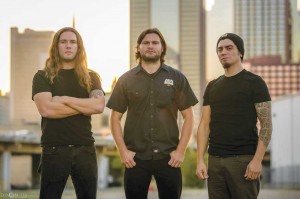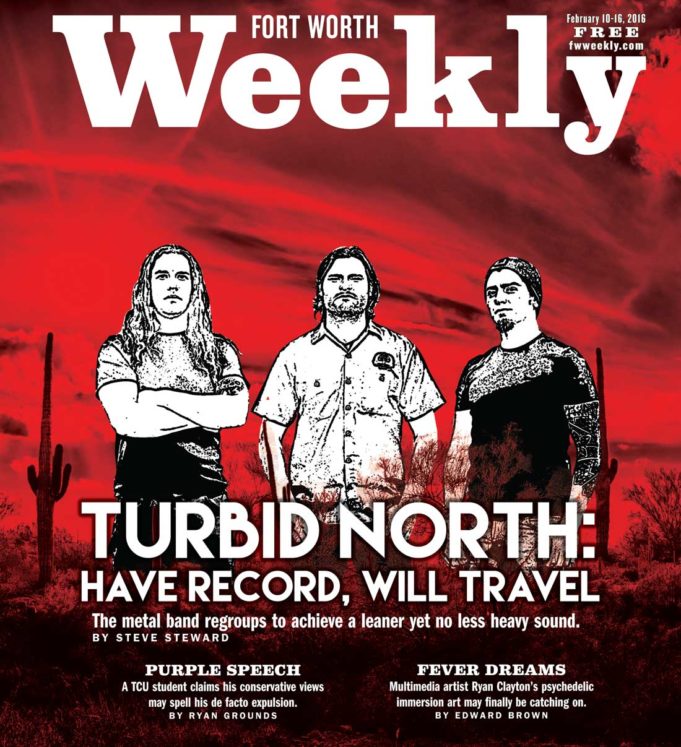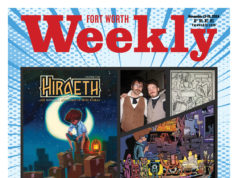The last time I interviewed Turbid North, the Alaskan-born, Texas-based death metal band, was on a brief break from touring in support of Orogeny, a full-length album released on a notable indie metal label called Ironclad Recordings. At the time, in June 2012, Turbid North was composed of three Alaskan ex-pats: Alex Rydlinski on guitar, his brother Adam on drums, and their friend Nick Forkel on guitar, plus English émigré Chris O’Toole on bass, who had been looking for a band to join in conjunction with an impending move to Texas. Brian McCoy, a friend from the Dallas metal scene joined as the vocalist after his own band, Debris, experienced a membership shuffle. The five guys were riding high on the strength of Orogeny, an album that colored outside death metal’s stylistic boundaries in shades of ambient blues and psychedelic, Pink Floydian sonic passages.
Now, nearly four years later, Turbid North has a new album, one that further delves into interests beyond rigid rules regarding blast beats and growled vocals. And they are ready to tour the record, committed to the cause, in fact. But now the band is a trio. And they’ve put the album out themselves. In a lot of ways, it’s as if Turbid North is starting over from scratch.
But even four years ago, Turbid North’s ambitions with Orogeny were tempered by adversity. In a Fort Worth Weekly article from 2012, O’Toole mentions a couple of planned tours — a U.S. run with Unearth and an Australian trip with Santa Barbara’s Devildriver — that had both fallen through. According to O’Toole, that was still fairly early in Orogeny’s album cycle, that window of touring opportunity when a record is relatively fresh. Usually, a band that’s frequently on the road spends between a year or two playing shows to promote the album. Forkel said that by the end of that period, the Rydlinski brothers were starting to lose interest.

“Toward the end of that year, after Orogeny came out, we did this tour for a month that wasn’t very successful,” he said. “I think we had, like, two good shows, so when we came home, those guys were kind of bummed out. We could just tell that they just weren’t into the band anymore. They stayed on for about three more months, making an effort, but they kind of just threw in the towel and said they didn’t want to do it anymore.”
Adam Rydlinski was the first to move on, Forkel said.
“Adam, he just realized he couldn’t do it anymore,” he said. “He started a family and had to step down, and Jon worked out really well replacing him. I just think it was the following year of grinding on the tour that the other two guys (Alex and Brian) just got burned out.”
But even back in 2007, when the Rydlinskis and Forkel had moved to North Texas from North Pole, Alaska, they’d brought a singer with them who’d quit once he’d learned that the touring band lifestyle wasn’t for him, so it wasn’t as if the band couldn’t deal with membership shifts. And Forkel’s original role was in the bass slot until O’Toole joined the band, so adapting to change seems to be hardwired into Turbid North’s band DNA.
“We had to replace our first singer, Jason, with Brian McCoy,” O’Toole said. When Jason went back to Alaska, Nick and I had a chat and agreed that if Brian ever left, we would never bother getting another singer again.” Forkel, who sang backing and co-lead vocals on Orogeny, now takes care of singing duties.
The problem, of course, was playing material with distinctive vocals (as much as is possible for the genre’s hallmark guttural growling) and written with parts for two guitars. The band toyed with getting new members, but in the end, they elected to remain a trio.
Forkel attributes this to his bandmates’ mutual drive to be musicians.
“I think we knew we were gonna be OK because the three of us know we wanted to keep doing this,” he said. “We didn’t want to get another guy who might have been a weak link or whatever, someone who might back out later.”
Part of that solidarity came from working on an album for an entire year.
“We noticed that we’d been totally involved and in the headspace of living with this new record for a long time,” Garrett said. “Some of these songs were written with two guitar parts, so we thought about auditioning new members after the record was done, but nobody really understands how we agonized over these songs.”
Garrett said that after the Rydlinskis and McCoy had left the band, the newer, leaner iteration of Turbid North spent the following year demoing and writing Eyes Alive, a concept album about a future in which mankind is forced to live underground because of a dying sun. The band renovated a rental house that O’Toole (whose non-musical gig is property management) had bought and spent the next 12 months tweaking sounds and arrangements and tracking them.
“It took a long time because we tracked 15 songs, but our goal was to make the best record, like make it so there was no way it would suck,” O’Toole said. “If there was a good mic to be bought, we found a way to get it. We sold a lot of gear just to buy the best recording equipment.”
Compared to the house where he and the band produced Orogeny (“It had carpeted floors. I didn’t know what I was doing,” Forkel admitted) O’Toole’s rental house allowed for louder volumes and longer hours. With no overhead expenditures other than their time and new microphones, the band was able to spend a lot of time perfecting its new vision for Turbid North’s sound.
Unfortunately, perfecting that record meant a lengthy hibernation, and it wasn’t until early last fall that the band emerged to play some shows in advance of Eyes Alive’s release.
“We mostly got out there to work out the new material live,” said Garrett. “Even then, we were still thinking about adding another guitar player, but fans of the old material were just happy we were back playing shows, and almost everyone has responded well to the new songs.”
The band’s attention to sonic detail pays dividends. While Orogeny sounded clear and professional, the sound bears the pristine sheen of a novice engineer. Forkel learned a lot from producing and engineering other bands in the interim between that album and Eyes Alive. The latter’s textures are more nuanced, and the arrangements broader, shifting from double-kick attacks and exacting, laser-precise, distorted rhythms to moody swaths of effects-laden guitar exploration. Sure, the fury remains, but Eyes Alive sounds warmer, grittier, and more dynamic. It’s somewhat fitting that the warmer, bigger sound showcases a suite of songs about living on an Earth plagued by a red giant, versus Orogeny’s chilly, technical perfection.
Besides a jump in production quality, the songs stray even further from Orogeny’s death metal spine. Songs like “The Burning Sky” and “The Great Dying” are expansive mid-tempo journeys of guitar textures. As such, Turbid North has at least as much in common with more progressive metal bands like Mastodon or Elder as they do with death metal stalwarts like Carcass or Obituary.
“I think the new record is more visceral,” said Garrett. “It’s like we took some sandpaper and roughed it up. We’re making a lot of noise up there, and I think it’s just as heavy.”
Forkel and his two bandmates have set their sights on charting a new course for what is in many ways a new band.
“I don’t like putting a label on us,” Forkel said. “I tell people it’s heavy music.”












